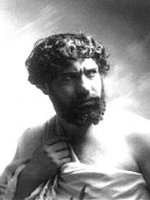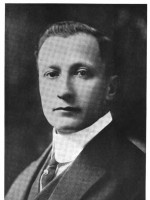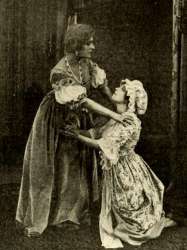Natalina Cavalieri is a Actor Italienne born on 25 december 1874 at Viterbo (Italie)
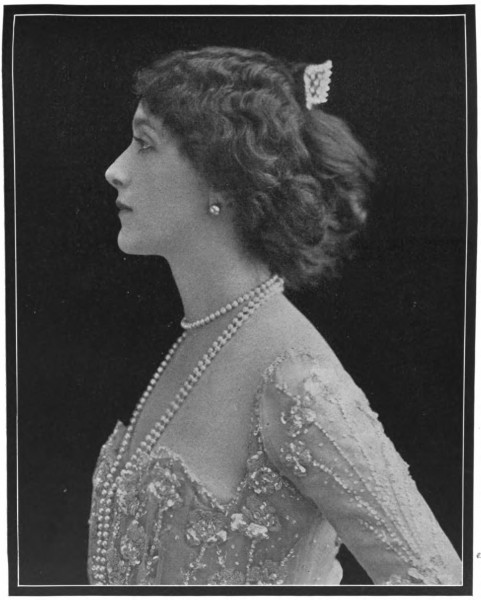
Natalina "Lina" Cavalieri (25 December 1874 – 7 February 1944) was an Italian opera soprano singer, actress, and monologist.
At a young age, she made her way to Paris, France, where her appearance opened doors and she obtained work as a singer at one of the city's café-concerts. From there she performed at a variety of music halls and other such venues around Europe, while still working to develop her voice. She took voice lessons and made her opera debut in Lisbon, Portugal, in 1900 (as Nedda in Pagliacci), the same year she married her first husband, the Russian Prince Alexandre Bariatinsky. In 1904, she sang at the Opéra de Monte-Carlo then in 1905, at the Sarah Bernhardt Theatre in Paris, Cavalieri starred opposite Enrico Caruso in the Umberto Giordano opera Fedora. From there, she and Caruso took the opera to New York City, debuting with it at the Metropolitan Opera on 5 December 1906.
Cavalieri remained with the Metropolitan Opera for the next two seasons, performing again with Caruso in 1907, in Puccini's Manon Lescaut. Renowned as much for her great beauty as for her singing voice (and acting ability), she became one of the most photographed stars of her time. Frequently referred to as the "world's most beautiful woman", she was part of the tightlacing tradition that saw women use corsetry to create an "hour-glass" figure. During the 1909–1910 season she sang with Oscar Hammerstein's Manhattan Opera Company. Her first marriage long over, she had a whirlwind romance with Robert Winthrop Chanler (1872–1930), a member of the Astor family and Dudley–Winthrop family. They married on 18 June 1910 but separated by the end of their honeymoon, and their divorce became final in June 1912. After the divorce, Cavalieri returned to Europe where she became a much-loved star in pre-revolutionary St. Petersburg, Russia, and in Ukraine.
Other operas in her repertoire included La bohème, La traviata, Faust, Manon, Andrea Chénier, Thaïs, Les contes d'Hoffmann (as the courtesan Giulietta), Rigoletto, Mefistofele (as both Margarita and Elena), Adriana Lecouvreur, Tosca, Hérodiade (as Salomé), Carmen (the title role), Siberia, and Zazà.
During her career, Cavalieri sang with other prominent singers, including Giuseppe Anselmi, Mary Garden (the world premiere of Massenet's Chérubin, 1905), Mattia Battistini, Titta Ruffo, Feodor Chaliapin, Nikolay Figner, Antonio Scotti, Vanni Marcoux, Giovanni Zenatello, Tito Schipa, and the French tenor Lucien Muratore, whom she married in 1913 after his divorce from soprano Marguerite Bériza. After retiring from the stage, Cavalieri ran a cosmetic salon in Paris. In 1914, on the eve of her fortieth birthday – her beauty still spectacular – she wrote an advice column on make-up for women in Femina magazine and published a book, My Secrets of Beauty. In her parisian Institut de Beauté, she licensed Parfums Isabey Paris and not only sold Isabey perfumes but developed in 1926 a range of beauty products and launched the same year her own perfume, apparently inspired by Leonardo da Vinci's Mona Lisa - she called 'Mona Lina' The Bottle was designed by Julien Viard.". In 1915, she returned to her native Italy to make motion pictures. When that country became involved in World War I, she went to the United States where she made four more silent films. The last three of her films were the product of her friend, the Belgian film director Edward José. Almost all of her films are considered lost films.
After marrying her fourth husband Paolo d’Arvanni, she returned to live with her husband in Italy. Well into her sixties when World War II began, she nevertheless worked as a volunteer nurse. Cavalieri was killed on 8 February 1944 during an Allied bombing raid that destroyed her home in Florence near Poggio Imperiale, where she was placed under police surveillance because of her foreign husband. Hearing an American bomber nearby, Cavalieri, her husband, and servants ran to the air-raid shelter in the grounds, but Cavalieri and her husband were delayed because they were collecting her valuable jewellery from the house. Both Cavalieri and her husband were killed running to the air-raid shelter, while the servants inside the shelter all survived.
Lina Cavalieri's discography is slim. In 1910, for Columbia, she recorded arias from La bohème, Tosca, Manon Lescaut, Carmen, Mefistofele, and Faust, as well as the song, "Maria, Marì! (Ah! Marì! Ah! Marì!)." In 1917, for Pathé, the soprano recorded "Le rêve passé," with Muratore. For American Pathé, she recorded arias from Carmen and Hérodiade.
She was painted by the Italian artist Giovanni Boldini (acquired by Maurice Rothschild) and by the Swiss-born American artist Adolfo Müller-Ury (1862–1947). The latter is now the property of the Metropolitan Opera, the gift of Nicholas Meredith Turner in memory of his wife, the soprano Jessica Dragonette. Hers is the face that appears repeatedly, obsessively, in Piero Fornasetti's designs.
In 1955, Gina Lollobrigida portrayed Cavalieri in the film Beautiful But Dangerous (also known as The World's Most Beautiful Woman). In 2004, a book was published, written by Paul Fryer and Olga Usova, titled Lina Cavalieri: The Life of Opera’s Greatest Beauty, 1874—1944.
Source : Wikidata
Natalina Cavalieri

Nationality Italie
Birth 25 december 1874 at Viterbo (Italie)
Death 8 february 1944 (at 69 years) at Florence (Italie)
Birth 25 december 1874 at Viterbo (Italie)
Death 8 february 1944 (at 69 years) at Florence (Italie)
Biography
Lina Cavalieri was born on Christmas Day at Viterbo, some 80 kilometres (50 mi) north of Rome. She lost her parents at the age of fifteen and became a ward of the state, sent to live in a Roman Catholic orphanage. The vivacious young girl was unhappy under the strict discipline of the nuns, and at the first opportunity she ran away with a touring theatrical group.At a young age, she made her way to Paris, France, where her appearance opened doors and she obtained work as a singer at one of the city's café-concerts. From there she performed at a variety of music halls and other such venues around Europe, while still working to develop her voice. She took voice lessons and made her opera debut in Lisbon, Portugal, in 1900 (as Nedda in Pagliacci), the same year she married her first husband, the Russian Prince Alexandre Bariatinsky. In 1904, she sang at the Opéra de Monte-Carlo then in 1905, at the Sarah Bernhardt Theatre in Paris, Cavalieri starred opposite Enrico Caruso in the Umberto Giordano opera Fedora. From there, she and Caruso took the opera to New York City, debuting with it at the Metropolitan Opera on 5 December 1906.
Cavalieri remained with the Metropolitan Opera for the next two seasons, performing again with Caruso in 1907, in Puccini's Manon Lescaut. Renowned as much for her great beauty as for her singing voice (and acting ability), she became one of the most photographed stars of her time. Frequently referred to as the "world's most beautiful woman", she was part of the tightlacing tradition that saw women use corsetry to create an "hour-glass" figure. During the 1909–1910 season she sang with Oscar Hammerstein's Manhattan Opera Company. Her first marriage long over, she had a whirlwind romance with Robert Winthrop Chanler (1872–1930), a member of the Astor family and Dudley–Winthrop family. They married on 18 June 1910 but separated by the end of their honeymoon, and their divorce became final in June 1912. After the divorce, Cavalieri returned to Europe where she became a much-loved star in pre-revolutionary St. Petersburg, Russia, and in Ukraine.
Other operas in her repertoire included La bohème, La traviata, Faust, Manon, Andrea Chénier, Thaïs, Les contes d'Hoffmann (as the courtesan Giulietta), Rigoletto, Mefistofele (as both Margarita and Elena), Adriana Lecouvreur, Tosca, Hérodiade (as Salomé), Carmen (the title role), Siberia, and Zazà.
During her career, Cavalieri sang with other prominent singers, including Giuseppe Anselmi, Mary Garden (the world premiere of Massenet's Chérubin, 1905), Mattia Battistini, Titta Ruffo, Feodor Chaliapin, Nikolay Figner, Antonio Scotti, Vanni Marcoux, Giovanni Zenatello, Tito Schipa, and the French tenor Lucien Muratore, whom she married in 1913 after his divorce from soprano Marguerite Bériza. After retiring from the stage, Cavalieri ran a cosmetic salon in Paris. In 1914, on the eve of her fortieth birthday – her beauty still spectacular – she wrote an advice column on make-up for women in Femina magazine and published a book, My Secrets of Beauty. In her parisian Institut de Beauté, she licensed Parfums Isabey Paris and not only sold Isabey perfumes but developed in 1926 a range of beauty products and launched the same year her own perfume, apparently inspired by Leonardo da Vinci's Mona Lisa - she called 'Mona Lina' The Bottle was designed by Julien Viard.". In 1915, she returned to her native Italy to make motion pictures. When that country became involved in World War I, she went to the United States where she made four more silent films. The last three of her films were the product of her friend, the Belgian film director Edward José. Almost all of her films are considered lost films.
After marrying her fourth husband Paolo d’Arvanni, she returned to live with her husband in Italy. Well into her sixties when World War II began, she nevertheless worked as a volunteer nurse. Cavalieri was killed on 8 February 1944 during an Allied bombing raid that destroyed her home in Florence near Poggio Imperiale, where she was placed under police surveillance because of her foreign husband. Hearing an American bomber nearby, Cavalieri, her husband, and servants ran to the air-raid shelter in the grounds, but Cavalieri and her husband were delayed because they were collecting her valuable jewellery from the house. Both Cavalieri and her husband were killed running to the air-raid shelter, while the servants inside the shelter all survived.
Lina Cavalieri's discography is slim. In 1910, for Columbia, she recorded arias from La bohème, Tosca, Manon Lescaut, Carmen, Mefistofele, and Faust, as well as the song, "Maria, Marì! (Ah! Marì! Ah! Marì!)." In 1917, for Pathé, the soprano recorded "Le rêve passé," with Muratore. For American Pathé, she recorded arias from Carmen and Hérodiade.
She was painted by the Italian artist Giovanni Boldini (acquired by Maurice Rothschild) and by the Swiss-born American artist Adolfo Müller-Ury (1862–1947). The latter is now the property of the Metropolitan Opera, the gift of Nicholas Meredith Turner in memory of his wife, the soprano Jessica Dragonette. Hers is the face that appears repeatedly, obsessively, in Piero Fornasetti's designs.
In 1955, Gina Lollobrigida portrayed Cavalieri in the film Beautiful But Dangerous (also known as The World's Most Beautiful Woman). In 2004, a book was published, written by Paul Fryer and Olga Usova, titled Lina Cavalieri: The Life of Opera’s Greatest Beauty, 1874—1944.
Usually with
Filmography of Natalina Cavalieri (7 films)
Actress
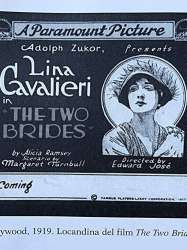
The Two Brides (1919)
Directed by Edward José
Origin USA
Actors Natalina Cavalieri, Courtenay Foote, Warburton Gamble, Hal Reid
Roles Diana di Marchesi

A Woman of Impulse (1918)
, 50minutesDirected by Edward José
Origin USA
Genres Drama
Actors Natalina Cavalieri, Gertrude Robinson, Raymond Bloomer, Lucien Muratore, Ida Waterman, Leslie Austin
Roles Leonora - 'La Vecci'
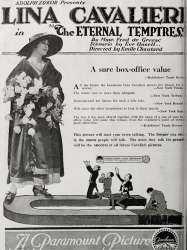
The Eternal Temptress (1917)
, 50minutesDirected by Émile Chautard
Origin USA
Genres Drama
Actors Natalina Cavalieri, Elliott Dexter, Alan Hale, Edward Fielding
Roles Princess Cordelia
As described in a film magazine, Harry Althrop (Dexter), a young American, is in love with Princess Cordelia (Cavalieri) and when he finds his funds are getting low he forges the signature of Thomas Lawton (Laffey), the American ambassador and a close friend of his father, to a check so that he might buy the beautiful Italian princess some jewelry. Count Rudolph Frizel (Hale) of Austria, anxious to obtain information concerning Italy's stand in an approaching war, threatens to expose Harry unless he provides the documents from the American embassy. It turns out that the specific documents are readily available with the ambassador, and Harry picks them up and gives them to the Count. This act is discovered by the ambassador and Harry is brought to trial. Cordelia learning of Harry's predicament, goes to Count Frizel and kills him to obtain the documents. The documents are then returned to the embassy, and Harry is released. Cordelia returns home, takes poison and dies in her lovers arms. The film ends with Cordelia on her bier.
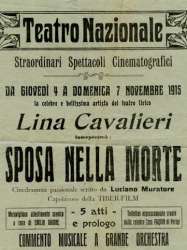
The Shadow of Her Past (1915)
Directed by Emilio Ghione
Genres Drama
Actors Natalina Cavalieri, Ida Carloni Talli, Alberto Collo, Diomira Jacobini, Lucien Muratore
 Connection
Connection


